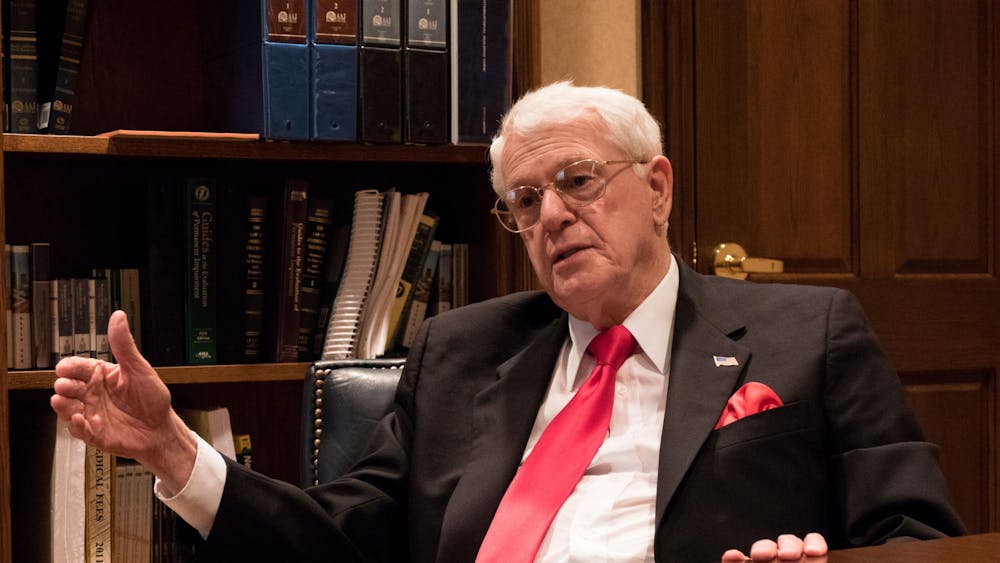For the last 40 years, the U.S. has maintained a comprehensive economic embargo on Cuba. \nThe embargo was established in 1960 shortly after the fledgling communist leader, Fidel Castro, came to power in a country 90 miles off the Florida coastline. Since then, relations between the United States and Cuba have been frozen in a contentious stalemate.\nIn search of a creative way to overcome the impasse, Jack Hopkins, a retired IU professor and former Bloomington City Council member, helped found CUBAmistad -- the Bloomington-Santa Clara Sister City Project in the fall of 1998. \n"We decided that we would make our own foreign policy," Hopkins said. \nIn establishing a sister city relationship with Santa Clara, Hopkins said the group hopes to "encourage dialogue and understanding" between citizens of Cuba and the United States by facilitating visitor exchanges and the "sharing of friendship, culture and resources." \nIn Spanish, "amistad" literally means friendship.\nHopkins said they picked Santa Clara, Cuba, as Bloomington\'s sister city because it was a good fit. Located in central Cuba, Santa Clara has about 200,000 residents and a large university. And like Bloomington, it's home to a large refrigerator plant.\n"Santa Clara even has a few limestone quarries," Hopkins said.\nCUBAmistad has recently announced that Bloomington will host the third annual national conference of the United States-Cuba Sister City Association an umbrella organization that assists U.S.-Cuba sister city organizations like CUBAmistad. The conference runs June eighth through the tenth at the Showers Building in downtown Bloomington. \nSince its inception, CUBAmistad has sent two American delegations to Cuba -- one in 1999 and another in 2000. Jack Hopkins and his wife Katherine were the sole members of the first trip that solidified the relationship between the two cities. \nJack Hopkins said they received a "warm, friendly welcome." \n"We just had a wonderful time," he said.\nCrediting CUBAmistad with several tangible accomplishments, Hopkins stressed their medical supply program, which they began last year. IU, Riley and Methodist hospitals in Indianapolis donated a total of three semi-truck loads full of medical equipment to CUBAmistad, which they in turn delivered to hospitals in Santa Clara and Havana. \n The group plans to continue shipping medical supplies to hospitals in Cuba that Hopkins said are in "dire need" of such equipment. \n CUBAmistad is also planning a service-learning class, which will bring IU students to Santa Clara where they will work with the town and the Central University of Los Villas on a number of service learning projects. Jack Hopkins will teach the eight-week course, which will take place in the fall of 2002 and will include a spring break trip to Santa Clara. \nJack Hopkins hopes that the upcoming conference in Bloomington will not only bring together members of a number of U.S.-Cuba sister city organizations from around the U.S. but that it will also provide the opportunity for U.S. members to meet with their Cuban counterparts. \nCUBAmistad is still working to secure visas for a number of prospective Cuban conference attendees. While Hopkins is hopeful that potential conference participants like the mayor of Santa Clara and Jose Roman Ruiz Hernandez, Santa Clara's provincial health director, will be able to obtain visas, he laments the difficulty of doing so.\nThe conference, which is open to the public, will include a series of panels and workshops as well as feature talks by Fernando Remirez de Estenoz, head of the Cuban Interests Section in Washington, and Mayor John Fernandez. \nAmber Gallup, who is handling publicity for the event, said that the conference will provide an opportunity for community members to learn about the "Bloomington-Santa Clara Sister City Project and all the possibilities that this relationship provides." Registration information is available at CUBAmistad's Web site: bloomington.in.us/~amistad.\nBloomington City Council member and physician Anthony Pizzo joins Gallup in encouraging IU students and community members to attend the conference. Pizzo visited Cuba last year along with Bloomington City Council member Chris Gaal and a number of other CUBAmistad delegates. \n"People who come out to the conference and learn more about the Sister City Project will be able to appreciate the impact it might have on the future if sister city partnerships continue to expand throughout the world," Pizzo said. \nHe has high hopes for sister city programs. \n"I think that if this program were more widespread and more participatory for all countries we would have a peaceful world eventually," said Pizzo. \nPizzo agrees with Hopkins that a fresh approach is needed to U.S.-Cuba relations. \n"The only reason we put it on," said Pizzo in reference to the embargo, "was to get rid of Castro, but he is just as entrenched now as he was 40 years ago." \nCUBAmistad's approach to fostering better relations by forming links between the people of each country appeals to Pizzo. He said that "we send ambassadors and other personnel to other countries to ensure good relations, but they never really form good relationships because they only get to know the administration and the elite -- they never get to know the common people."\nAs a physician, Pizzo said he valued the opportunity that his trip provided him to visit Cuban hospitals and meet with Cuban doctors. \n"They are just short of everything, its very sad," Pizzo said. The twelve dialysis units that CUBAmistad delivered to Cuban hospitals last year was equipment that Pizzo said was "desperately needed."\nWhile U.S. leaders emphasize that the embargo on Cuba exempts food and medicine, "the fact is they just don't get the medical supplies they need," Pizzo said. He said that the embargo is largely to blame because it contributes to the formation of negative attitudes towards Cuba as a whole and it hurts their economy, which limits their ability to purchase medical equipment. Pizzo strongly advocates dissolving the embargo. \n"We may not like Castro," he said, "but the people down there are just like us -- they need medicine as badly as sick Americans do"
Bloomington to hold conference with Cuban city
Get stories like this in your inbox
Subscribe





